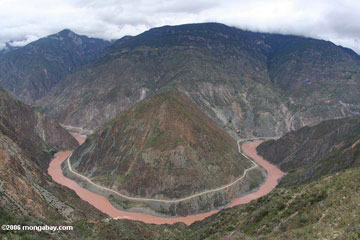Damage to Yangtze “irreversible” says China
Damage to Yangtze “irreversible” says China
Rhett A. Butler, mongabay.com
April 16, 2007
Pollution, dams and excessive boat traffic have caused an “largely irreversible” decline in the aquatic ecology of the Yangtze says a report issued by China’s official State Environmental Protection Administration (SEPA).
The report reveals that the more than 600 kilometers of the river are in “critical condition” and nearly 30 percent of its major tributaries, including the Minjiang, Tuojiang, Xiangjiang, and Huangpu rivers, are “seriously polluted.” It further indicates that the river’s annual harvest of aquatic products dropped by about 77 percent between the 1950s and the 1990s, from 427,000 tons to roughly 100,000 tons.
“The impact of human activities on the Yangtze water ecology is largely irreversible,” said Yang Guishan, a researcher of the Nanjing Institute of Geography and Limnology under the Chinese Academy of Sciences and one of the chief editors of the report. “It’s a pressing job to regulate such activities in all the Yangtze drainage areas and promote harmonious development of man and nature.”
 The muddy upper Yangtze in northwestern Yunnan
|
The report, conducted by the Chinese Academy of Sciences, Yangtze River Water Resources Commission and environmental group WWF, also warned of increasing flood risks.
“Flood control remains an arduous task along the Yangtze, given the rising temperature and frequent occurrences of extreme weather over the last 50 years,” said Yang who noted that 70-75 percent of China’s floods are tied to the Yangtze.
Several dams are currently being constructed on the river including Three Gorges Dam, the largest dam the world has ever seen. The report says that while Three Gorges will reduce the risk of flooding in the middle stretches of the river, lower reaches will still be vulnerable. Further, the report warned that the Three Gorges reservoir is already “seriously polluted by pesticides, fertilizers, and sewage from passenger boats.” A separate report, also released Monday, showed that nitrogen and phosphorus accounted for 60-70 percent of these pollutants.
China says it has already allocated US$513 million to “offset the impact of the dam on the ecology, the local environment, and the local people” and that it plans to spend more to address social and environmental concerns. Estimates for the total cost of the dam range from $25-$100 billion.
“We have to take into consideration the proper settlement of the people who have been displaced, environmental protection, heavy silting, and the prevention of geological disasters,” state media quoted Professor Weng Lida, former head of the Yangtze River Water Resources Commission, as saying. “Faster is not always better… Higher water levels will worsen pollution and silting. We have to seek more sustained development.”
Water pollution and availability is one of China’s most pressing environmental issues. A 2005 government study showed that about 300 million Chinese drink unsafe water tainted by chemicals and other contaminants and that 90% of China’s cities have polluted ground water.
Related articles
China’s Imminent Water Crisis. About 300 million Chinese drink unsafe water tainted by chemicals and other contaminants according to a new report from the Chinese government. A leading government official said the greatest non-drought threat to China’s water resources, is chemical pollutants and other harmful substances that contaminate drinking supplies for 190 million people.
China misses pollution targets. China’s environmental protection agency said that the country failed to meet any of its 2006 pollution control goals according to its web site. The State Environmental Protection (SEPA) admitted that economic growth actually caused the country to fall well behind its environmental targets.
China to spend $175 billion on the environment. China plans to spend about $175 billion protecting its environment over the next five years according to a report from BBC News. The money will be used to reduce pollution, improve water quality, and cut soil erosion.
This article is based on a news release from the State Environmental Protection Administration
